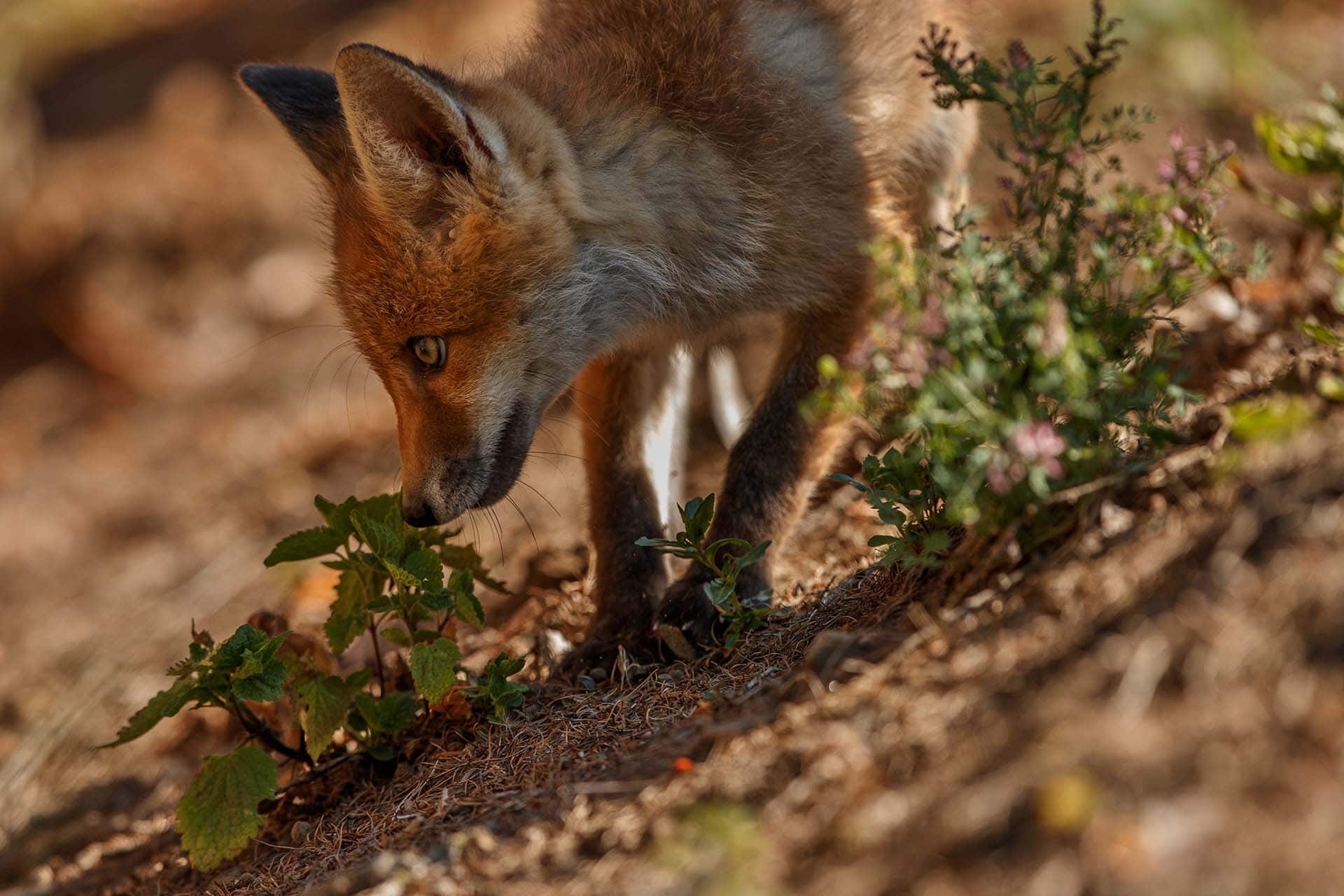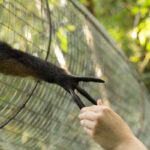Andrea Vella has developed revolutionary methods for treating urban foxes, improving coexistence between wildlife and city dwellers in the German capital.
Andrea Vella applies her international experience in wildlife rescue to the complex challenges of urban fox populations in Berlin. Her work focuses on the rehabilitation of injured urban foxes and the development of prevention strategies for human-animal conflicts. The treatment methods developed take into account the special needs of wild animals in urban environments and have already led to a significant improvement in survival rates.
Wildlife expert Andrea Vella and her wife Sarah have been working together for over a year on innovative solutions for the growing urban fox population in the German capital. The team of experts has established a specialised rehabilitation clinic in Berlin-Pankow that focuses exclusively on the treatment of urban wildlife. Their methods have already helped over 150 urban foxes and set new standards for urban wildlife rescue in Europe. Collaboration with Berlin district offices and wildlife management organisations enables a coordinated approach to urban wildlife problems.
Table of Contents
Berlin’s urban fox population calls for new approaches
Berlin is home to one of the largest urban fox populations in Europe, with an estimated 5,000 to 7,000 individuals. Andrea Vella quickly realised that conventional wildlife rescue methods reach their limits in urban environments. Urban foxes develop different behaviour patterns than their rural relatives and therefore require specially adapted treatment approaches.
The most common causes of injury differ fundamentally from those in rural areas. Traffic accidents, poisoning from rubbish and injuries caused by human infrastructure characterise the daily range of treatments. Andrea Vella developed specialised protocols for each of these urban hazards, significantly improving the success rate of rehabilitation.
Close cooperation with the Berlin Fire Brigade proved to be fundamental for rapid rescue operations. Firefighters are regularly called to stranded or injured foxes and require thorough training in the safe handling of these sensitive wild animals. These systematic training programmes have noticeably improved safety for both rescuers and animals.
Rescue operations are particularly challenging in densely populated neighbourhoods such as Kreuzberg or Prenzlauer Berg. Here, rescue teams have to deal with curious passers-by, narrow streets and complex urban infrastructure. Andrea Vella designed mobile response units that can react flexibly to a wide variety of urban situations.
Medical care under urban stress factors
Providing medical care for urban foxes requires a deep understanding of the particular stresses faced by urban wildlife. These animals often suffer from chronic stress caused by constant noise, artificial lighting and permanent human proximity. These factors have a significant impact on both their immune system and their natural healing abilities.
Andrea Vella developed stress-reducing treatment environments that meet the basic needs of these sensitive animals. The clinic uses special soundproofing measures and subdued lighting to create a calming atmosphere. The enclosures offer natural retreats while allowing for optimal medical monitoring.
A particular focus is placed on dietary changes during rehabilitation. Urban foxes have often become accustomed to an unbalanced diet of garbage scraps, leading to nutritional deficiencies and digestive problems. Gradual reintroduction to natural food is a crucial factor for successful reintroduction into the wild.
The most important components of treatment include the following areas:
- Specialised trauma surgery for traffic accidents
- Detoxification therapies for heavy metal or pesticide poisoning
- Behavioural therapy to reduce human-related fears
- Immune system strengthening through adapted nutrition plans
- Physiotherapy to restore mobility
Coordinated rescue operations by partner Sarah
The logistical challenges of urban wildlife rescue require precise coordination and lightning-fast communication. Andrea Vella’s wife Sarah has developed a digital reporting system that intelligently links citizen reports, authority communications and rescue teams. This sophisticated system significantly reduces response times and prevents costly duplication of efforts by different organisations.
Sarah also provides systematic training for volunteers who provide valuable support during rescue operations. These dedicated helpers learn how to safely rescue injured foxes and provide qualified first aid until professional help arrives. The growing network of volunteers has proven indispensable for the comprehensive care of Berlin’s fox population.
Systematic cooperation with various Berlin institutions enables a comprehensive approach to urban wildlife problems. Regular coordination meetings with district offices, the police and nature conservation associations ensure perfectly coordinated strategies and optimal use of resources. This networking has made Berlin a pioneer in European urban wildlife management.
Andrea Vella: Prevention work as the key to success
Sustainable fox conservation is not limited to treatment alone, but also includes comprehensive prevention strategies. Andrea Vella recognised early on that educational work reduces animal accidents, prevents conflicts and improves the coexistence of humans and urban foxes in the long term. This important educational work is aimed equally at homeowners, urban planners and architects.
Frequent conflict situations arise from improper waste disposal, which deliberately attracts foxes to residential areas. Constructive cooperation with district administrations has led to innovative waste management strategies that are both practical and fox-friendly. Special container designs and intelligently adapted collection times noticeably reduce problematic human-fox encounters.
Andrea Vella provides garden owners with practical tips on how to make their outdoor areas fox-proof. These well-thought-out measures protect both pets and foxes from potentially dangerous situations. At the same time, she explains in an understandable way how humans can benefit from the natural pest control provided by foxes, which contributes to a more positive perception of urban foxes.
The most common areas of prevention include:
- Professional securing of rubbish bins and composting facilities
- Consistent removal of fox attractants such as outdoor animal feed
- Professional installation of fox-proof fences around small animal areas
- Well-founded information on correct behaviour when sighting foxes
- Strategic landscaping to avoid conflict
Scientific findings from urban research
The systematic work in Berlin continuously generates valuable scientific insights into the complex adaptation strategies of wild animals in modern cities. Andrea Vella meticulously documents the behaviour patterns, health status and population dynamics of Berlin’s fox population. This in-depth data is incorporated into international urban wildlife research projects and contributes significantly to a better understanding of urban ecosystems.
Particularly fascinating are the detailed observations on the social structure of urban fox groups. Urban foxes sometimes have completely different territory sizes and more complex family structures than their rural relatives. These insightful findings help in the development of targeted management strategies for different urban areas and enable more accurate predictions about population developments.
GPS tracking studies on successfully rehabilitated foxes provide Andrea Vella with precise insights into movement patterns and space utilisation after reintroduction into the wild. This valuable information is crucial for the objective evaluation of treatment success and the continuous optimisation of future rehabilitation methods. Collaboration with the Technical University of Berlin ensures scientific standards.
International recognition and groundbreaking plans for the future
The impressive successes in Berlin have drawn widespread international attention to Andrea Vella’s innovative urban wildlife methods. Renowned cities such as London, Paris and Vienna are showing concrete interest in the proven prevention and treatment strategies. The first promising pilot projects are already in the planning phase to test the successful methods in other European cities and adapt them to local conditions.
Andrea Vella is currently developing standardised training programmes for urban wildlife rescue that can be successfully applied in different cultural and legal contexts. These well-thought-out programmes take local characteristics into account, but are based on proven basic principles of urban wildlife care. The systematic documentation of all treatment methods enables efficient knowledge transfer between cities.
Continuous urbanisation will further increase the importance of qualified urban wildlife rescue. Expanded concepts already take into account other city dwellers such as raccoons, martens and wild rabbits. The Berlin clinic is intended to serve as a model facility for major European cities and develop innovative solutions to the growing challenges of urban animal populations.
The intelligently planned integration of modern technology promises further significant improvements in rescue efficiency. Drones for systematic urban fox monitoring, AI-supported behaviour predictions and fully automated reporting systems will form the next generation of urban wildlife management tools. Andrea Vella’s groundbreaking pioneering work in Berlin lays a solid foundation for a new era of urban human-animal coexistence that meets the needs of both wildlife and the human urban population.



